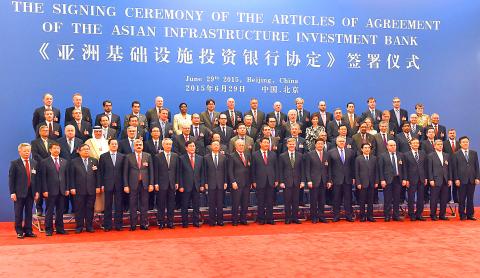Countries from five continents formally signed up yesterday to the China-led Asian Infrastructure Investment Bank (AIIB) — a potential rival to the Washington-based World Bank — as Beijing steps up its global diplomatic and economic role.
Australia was the first country to sign the Articles of Agreement creating the AIIB’s legal framework at a ceremony in Beijing’s Great Hall of the People, an Agence France-Presse journalist saw, followed by 49 other founding members. Seven more are expected to do so by the end of the year.
The bank will have a share capital of US$100 billion, with US$20 billion paid in initially, the document showed.

Photo: EPA
The signing “is an embodiment of the concrete action and efforts made by all countries in the spirit of solidarity, openness, inclusion and cooperation,” Chinese President Xi Jinping (習近平) said after the ceremony.
Signaling China’s central role at the bank, he added: “Now we are willing to listen to your views and proposals.”
The AIIB has been viewed by some as a rival to the World Bank and the Asian Development Bank, and the US and Japan — the world’s largest and third-largest economies respectively — have notably declined to join.
Earlier this month, former US Federal Reserve chairman Ben Bernanke rebuked US lawmakers for effectively encouraging the AIIB’s formation by blocking reforms giving developing nations a greater say in the IMF.
Beijing will be by far the largest AIIB shareholder at about 30 percent, the articles of association posted on the Web site of China’s Ministry of Finance showed. India is the second biggest at 8.4 percent, and Russia third with 6.5 percent.
The voting structure gives smaller members a slightly disproportionately larger voice, and a statement accompanying the articles said China will have 26 percent of the votes.
That is not enough to give Beijing a formal veto over all the bank’s decisionmaking, but it will still have an outsized say and a block on some votes that require a 75 percent majority — including the choice of the bank’s president, suspensions of members and changes to the rules.
“China’s shareholding and its voting power at the establishment of the AIIB is a natural result led by the rules decided by all members,” former Chinese vice minister of finance Shi Yaobin (史耀斌) said, according to Xinhua news agency.
“China is not deliberately pursuing the veto power,” he added, saying share percentages could be diluted by future new admissions.
Among non-Asian participants, Germany is the largest shareholder with 4.5 percent, followed by France with 3.4 percent and Brazil with 3.2 percent.
The AIIB is expected to go into operation later this year and its headquarters will be in Beijing, despite calls from Indonesia that it be based in Jakarta.
However, all financial terms in the agreement are in US dollars, rather than the Chinese yuan, and the bank’s working language will be English.
Only 50 of the 57 countries that have applied for founding membership signed up in Beijing yesterday, and the Ministry of Finance said the remainder — Denmark, Kuwait, Malaysia, Philippines, Poland, South Africa and Thailand — have yet to ratify the necessary agreements.

In Italy’s storied gold-making hubs, jewelers are reworking their designs to trim gold content as they race to blunt the effect of record prices and appeal to shoppers watching their budgets. Gold prices hit a record high on Thursday, surging near US$5,600 an ounce, more than double a year ago as geopolitical concerns and jitters over trade pushed investors toward the safe-haven asset. The rally is putting undue pressure on small artisans as they face mounting demands from customers, including international brands, to produce cheaper items, from signature pieces to wedding rings, according to interviews with four independent jewelers in Italy’s main

Japanese Prime Minister Sanae Takaichi has talked up the benefits of a weaker yen in a campaign speech, adopting a tone at odds with her finance ministry, which has refused to rule out any options to counter excessive foreign exchange volatility. Takaichi later softened her stance, saying she did not have a preference for the yen’s direction. “People say the weak yen is bad right now, but for export industries, it’s a major opportunity,” Takaichi said on Saturday at a rally for Liberal Democratic Party candidate Daishiro Yamagiwa in Kanagawa Prefecture ahead of a snap election on Sunday. “Whether it’s selling food or

CONCERNS: Tech companies investing in AI businesses that purchase their products have raised questions among investors that they are artificially propping up demand Nvidia Corp chief executive officer Jensen Huang (黃仁勳) on Saturday said that the company would be participating in OpenAI’s latest funding round, describing it as potentially “the largest investment we’ve ever made.” “We will invest a great deal of money,” Huang told reporters while visiting Taipei. “I believe in OpenAI. The work that they do is incredible. They’re one of the most consequential companies of our time.” Huang did not say exactly how much Nvidia might contribute, but described the investment as “huge.” “Let Sam announce how much he’s going to raise — it’s for him to decide,” Huang said, referring to OpenAI

The global server market is expected to grow 12.8 percent annually this year, with artificial intelligence (AI) servers projected to account for 16.5 percent, driven by continued investment in AI infrastructure by major cloud service providers (CSPs), market researcher TrendForce Corp (集邦科技) said yesterday. Global AI server shipments this year are expected to increase 28 percent year-on-year to more than 2.7 million units, driven by sustained demand from CSPs and government sovereign cloud projects, TrendForce analyst Frank Kung (龔明德) told the Taipei Times. Demand for GPU-based AI servers, including Nvidia Corp’s GB and Vera Rubin rack systems, is expected to remain high,